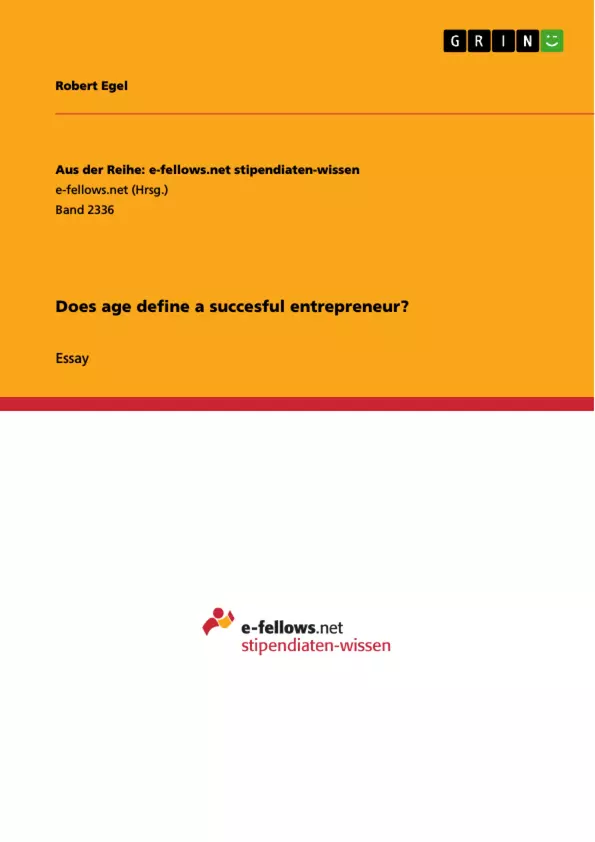Close your eye and image a talented and skillful entrepreneur for a moment
Is he or she a sixty-years old graduated astrophysicist or a young college dropout who was annoyed by boring assessment load? Is he or she a mother or a father of three who had put money aside before he or she founded a company or do you image a venturesome rebel who has his or her whole life in front of him or her? Is he or she a person who executes as a civil servant the same processes and activities for a long time or is he or she a creative mind who scrutinizes in his or her young ages everything and everyone?
If you have chosen the second variant for all three questions, you probably bought into the myth, which is always mentioned in the context of the age of entrepreneurs. A lot of people envision a young person if they think about successful entrepreneurs. Because of that the WirtschaftsWoche took among other myths this one up and tried to refute it.
Nevertheless, there is still a specific picture in the head. You think of Mark Zuckerberg who dropped out of college and founded Facebook with only nineteen years. Or of Bill Gates who was also nineteen years as he founded his company Microsoft.
But are these specific examples the proof that successful entrepreneurs must be young or are young entrepreneurs rather exceptional cases in an environment where older people have an advantage?
Inhaltsverzeichnis (Table of Contents)
- Does age define a successful entrepreneur?
- Entrepreneurship: Defining the Term
- The Age of Founders
- The Myth of Young Entrepreneurs
- Beyond the Age: Personal and Subject-Specific Qualifications
- Why Does the Myth Exist?
- Older Entrepreneurs: A Force to Be Reckoned With
Zielsetzung und Themenschwerpunkte (Objectives and Key Themes)
This essay aims to challenge the prevailing myth that successful entrepreneurs are always young. It explores the relationship between age and entrepreneurial success, examining both the common perception and the empirical evidence.
- The definition of entrepreneurship and its various interpretations
- The prevalence of young entrepreneurs in statistical data
- The potential advantages and disadvantages of different age groups in entrepreneurship
- The importance of personal characteristics and subject-specific qualifications in entrepreneurial success
- The need to recognize and value the contributions of older entrepreneurs
Zusammenfassung der Kapitel (Chapter Summaries)
- Does age define a successful entrepreneur? This introductory chapter establishes the essay's central question and introduces the prevailing myth of young entrepreneurs.
- Entrepreneurship: Defining the Term This section clarifies the definition of entrepreneurship, drawing on various perspectives from the literature.
- The Age of Founders This chapter presents data from various studies, including the KfW Foundation Monitor and the German Startup Monitor, highlighting the age distribution of entrepreneurs.
- The Myth of Young Entrepreneurs This section examines the common perception of young entrepreneurs as being more successful and analyzes data from the Gruenderszene ranking to assess this claim.
- Beyond the Age: Personal and Subject-Specific Qualifications This chapter explores the role of personal characteristics and subject-specific qualifications in entrepreneurial success, arguing that age is less significant than these factors.
- Why Does the Myth Exist? This section explores potential reasons for the widespread belief that young entrepreneurs are more successful.
- Older Entrepreneurs: A Force to Be Reckoned With This concluding chapter advocates for a more inclusive view of entrepreneurship, emphasizing the valuable contributions of older entrepreneurs.
Schlüsselwörter (Keywords)
This essay explores the relationship between age and entrepreneurial success, examining the common perception and empirical evidence. Key themes include entrepreneurship, age, success, personal characteristics, subject-specific qualifications, myth, and the contributions of older entrepreneurs.
Frequently Asked Questions
Does age determine the success of an entrepreneur?
No, age does not strictly define success. While media often highlights young founders like Mark Zuckerberg, empirical evidence suggests that older entrepreneurs often have advantages in experience and subject-specific qualifications.
Is the "young entrepreneur" success story a myth?
The idea that successful entrepreneurs must be young is considered a myth. Data from various monitors shows a wide age distribution among founders, refuting the stereotype that only college dropouts achieve major success.
What are the advantages of older entrepreneurs?
Older entrepreneurs often possess deeper industry knowledge, established professional networks, and more financial stability, which can be significant advantages in building a sustainable business.
What factors are more important than age for startup success?
Personal characteristics, such as resilience and creativity, as well as subject-specific qualifications and professional experience, are more decisive factors for success than chronological age.
Why does the myth of the young founder persist?
The myth persists partly due to high-profile media examples of young tech billionaires and a societal tendency to associate youth with innovation and risk-taking.
- Arbeit zitieren
- Robert Egel (Autor:in), 2017, Does age define a succesful entrepreneur?, München, GRIN Verlag, https://www.grin.com/document/367117



